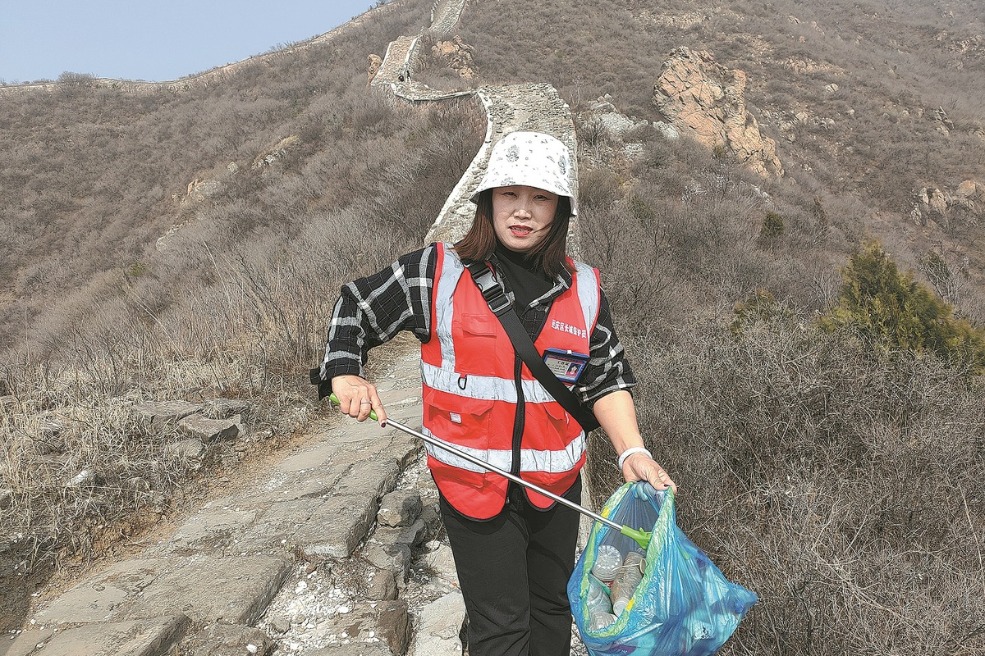Hong Kong on fast track to emerge as green finance hub

With public firms in the SAR gearing up to meet a sustainability deadline, experts are calling for higher professional standards and practices to help the city become a green finance center and achieve its carbon neutrality goals. Zhang Tianyuan reports from Hong Kong.

As Hong Kong races to become Asia's green finance hub, large publicly accountable entities listed on the Hong Kong Stock Exchange have been given a mandate — complying with international sustainability standards by 2028 in a process that promises to rewrite the rules of business reporting and unlock new opportunities in the green economy.
Yet, beneath this ambitious blueprint lies a stark reality. More than half of companies are struggling to have their carbon footprint fully tracked, while a critical shortage of environmental expertise threatens to thwart the city's green aspirations.
The special administrative region is rolling out a phased approach to aligning corporate sustainability reporting with the International Financial Reporting Standards Sustainability Disclosure Standards (ISSB Standards). The framework was issued in June 2023 to create a global baseline of sustainability disclosures.
The transition begins this year with firms listed on the HKEX's main board reporting their climate impact under a "comply or explain" rule that mirrors international climate disclosure standards. The stakes will be high in 2026 when heavyweights on the Hang Seng Composite LargeCap Index, which accounts for about 80 percent of the Hang Seng Composite Index's total market capitalization, face mandatory compliance.
The final phase will come after HKEX completes market consultations in 2027 on mandating sustainability reporting in line with local standards. By January 2028, large listed issuers, as well as nonlisted financial institutions of high standing, must fully embrace the new sustainability reporting regime.
Although Hong Kong companies, generally, have more than eight years' experience in sustainability reporting, full adoption of ISSB Standards, particularly in the disclosure of Scope 3 gas emissions, presents fresh challenges, says Judy Li, partner and ESG sustainability leader at EY Greater China.
The GHG Protocol, established in 1998 by the World Resources Institute and the World Business Council for Sustainable Development, defines emissions in three categories. Scope 1 covers direct emissions from owned sources like company vehicles and manufacturing; Scope 2 includes indirect emissions from purchased energy; while Scope 3 captures all indirect emissions across the value chain — from raw materials to product disposal.
The GHG Protocol framework, adopted by the International Sustainability Standards Board, has become the world's most widely adopted standard for carbon accounting.
A study conducted by KPMG and DBS Hong Kong last month showed that 60 percent of Hong Kong's largest listed companies across various fields had yet to report Scope 3 emissions although indirect emissions typically make up 70 percent of their total carbon footprint, with many citing data availability and quality challenges.
"The report highlighted that limited budget allocation was a barrier to adopting sustainability practices, and only 17 percent of the companies polled have leveraged financial instruments for their sustainability endeavors," says Boris Chan, managing director and head of institutional banking at DBS Hong Kong.
The financial sector faces unique challenges in Scope 3 reporting. "For banks and insurers, the challenge lies in assessing their investment portfolios," explains Li. "They need to determine whether they are funding high-emission or green industries, and calculate the net carbon impact of their investments."
Cross-border complexities
For Chinese mainland companies dual-listed on the HKEX, going green is proving to be more than just an environmental task. They have to juggle varying disclosure requirements while trying to meet different climate targets across multiple jurisdictions where they operate, according to Cyrus Cheung Lap-kwan, deputy president at CPA Australia for Greater China, who has over 15 years' experience in financial reporting and sustainability advisory work.
"Companies listed on the HKEX must comply with local disclosure requirements, but many are also listed on mainland exchanges like Shanghai, Beijing or Shenzhen," says Cheung. The standards adopted in these jurisdictions are not always aligned, and firms may face additional compliance requirements in conducting business operations.
Mainland exchanges tend to be "softer" as far as green disclosures are concerned. They "encourage" listed firms to report Scope 3 emissions — indirect carbons from waste disposal and business travel. The Hong Kong bourse takes a firmer stance, according to Governance Solutions Group — a Shenzhen-based ESG investing and sustainability service provider.
Another challenge lies in how companies map sustainable plans to achieve their climate goals. While the central government aims to peak carbon dioxide emissions by 2030 and achieve carbon neutrality before 2060, some other regions, including Hong Kong, seek to attain carbon neutrality by 2050.
Cheung says he believes that success in navigating these regulations and meeting targets hinges on upskilling employees and leveraging technology to streamline data collection for multiple compliance requirements. "As reporting requirements become more stringent, the technological retooling has shifted from nice-to-have to necessity. The question is whether companies can transform themselves fast enough to keep pace with regulators' green ambitions."
Expertise shortage
Technology alone can't bridge the environmental expertise gap. Hong Kong's ambition to become a green finance hub is facing a critical bottleneck — a shortage of technical environmental prowess. Such a gap is expected to widen further with the mandatory disclosure of value-chain emissions for Hong Kong-listed companies, says Ma Jun, chairman and president of the Hong Kong Green Finance Association.
Li agrees, singling out three emerging professional sectors — climate risk assessment, carbon footprint analysis, and investment portfolio redesign.
"Financial institutions need experts for climate stress testing to evaluate future investment results and identify potentially uninvestable sectors with sophisticated scenario analysis," she says.
As part of efforts to address the professional shortfall, the HKSAR government has granted statutory status to the Hong Kong Institute of Qualified Environmental Professionals in a significant step toward professionalizing the environmental sector.
The institute's ambitious goal is to unify professional standards across diverse environmental disciplines — from air quality and waste management to environmental impact assessments and water resources.
"There is a severe shortage of these technical skills," notes Freeman Cheung Chun-ming, president of the HKIQEP. "Successful green investment in environmental projects ultimately depends on having sound technical expertise and viable local projects." The institute's focus on environmental assessment capabilities provides a pivotal foundation for Hong Kong's green finance aspirations, he adds.
Cheung says the HKIQEP aims to extend its influence to the Guangdong-Hong Kong-Macao Greater Bay Area, potentially creating a regional standard for environmental professionals.
Hong Kong launched the Pilot Green and Sustainable Finance Capacity Building Support Scheme in 2022 to subsidize training in green and sustainable finance. Beyond developing local talent, the city has adjusted its immigration policies under the Quality Migrant Admission Scheme to attract people with international green expertise.
Time is running out for Hong Kong's listed firms. With just three years before the green reporting deadline, some companies may turn to the carbon market for a solution.
While companies can cut emissions through better technology and efficiency, some carbon footprints may prove stubborn to eliminate, and "a robust carbon market gives companies another tool as they work on longer-term solutions", says Cyrus Cheung.
The carbon market operates on two credit systems. The first is mandatory, with regulators setting emission limits, and companies exceeding these caps must purchase credits from more efficient firms that stay below their allotted quotas. The second is voluntary, with businesses buying these credits to compensate for emissions they're unable to feasibly reduce through direct operations or supply-chain improvements.
Hong Kong took the first step into this space in 2022 with Core Climate, launched by Hong Kong Exchanges and Clearing, which runs the city's bourse. The voluntary carbon market operates through private, over-the-counter deals and offers both Hong Kong-dollar and yuan settlement options for international carbon credit trading.
However, the SAR's current voluntary-only system lacks the muscle to drive meaningful change, says Cyrus Cheung. "For healthy market development, the government should consider having a carbon levy to create both voluntary and mandatory systems, encouraging companies to adopt carbon-offset practices."
CPA Australia has proposed a carbon tax of HK$100 ($12.80) per ton on companies emitting more than 25,000 metric tons of carbon dioxide equivalent annually, and businesses can offset their taxable emissions by up to 5 percent by purchasing carbon credits.
According to Chan, the proposed solution could exclude Hong Kong power utilities — the city's largest carbon emitters. "This isn't about special treatment," he says. "These companies already have agreed pathways with the government for transitioning from fossil fuels to alternative energy sources and are making significant investments in emission reduction."
Instead, he expects the proposed carbon tax to target other major emitters — from commercial buildings to industrial facilities. "This would push organizations to rethink their investment priorities, and ultimately support Hong Kong's carbon neutrality goals."
Collaboration among carbon trading marketplaces in the Greater Bay Area could also help carbon-belching companies access more international investors through better-matched carbon credit deals. HKEX has reached agreements with emissions exchanges in Shenzhen and Guangzhou to accelerate development of the region's carbon market ecosystem.




































